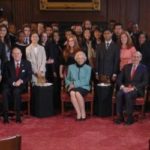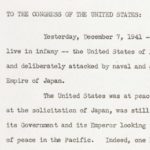This lesson will explore the implementation of the war-making power from the first declared war under the Constitution—the War of 1812—to the Iraq War. Using primary sources, students will investigate how the constitutional powers to initiate war have been exercised by the legislative and executive branches at several key moments in American history. They will also evaluate why and how the balance of authority in initiating war has changed over time, and the current balance of power.
The Vietnam War Lesson Guide
Explore classroom lesson plans related to Ken Burns’s and Lynn Novick’s 10-part, 18-hour documentary series, The Vietnam War, which tells the story of one of the most consequential, divisive and controversial events in American history. The series explores the human dimensions of the war through the testimony of nearly 80 witnesses from all sides.
The History of Memorial Day
From Suffragist Sashes to Antiwar Armbands
In a 19th Amendment video, produced by the Administrative Office of the U.S. Courts for use in classrooms, courtrooms, and the distance-learning space, an unlikely connection is made between two rights activists from different eras. Suffragette Virginia Minor and Vietnam war protester Mary Beth Tinker were separated by 100 years, but their passions came together in the legal history of the nation and of St. Louis, where they each worked through the courts to make social change. Both cases were decided – with different outcomes – by the Supreme Court of the United States.
Memorial Day Lesson Plans & Resources

Find new ways to discover the meaning of Memorial Day with students using the free K-12 resources in this curated collection from Share My Lesson. The lessons and activities honor military men and women who died while on duty and explore the wars they served in, as well as the impact on their families and our country.
1968: The Poor People’s Campaign
1968 was a tumultuous period in the United States. The Vietnam War, political assassinations and civil rights issues were among some of the challenges the country faced as solutions were sought. At this time, Martin Luther King Jr. organized the Poor People’s Campaign to shift the focus of the civil rights movement to economic issues; however, Reverend King was assassinated weeks before the campaign got underway in Washington, D.C. In this lesson, students will learn about the circumstances that gave rise to this campaign and how it is relevant today.
Women & the American Story: Growth and Turmoil, 1948-1976
This free curriculum unit from the New-York Historical Society explores the decades following World War II and considers the action that different groups took to advocate for their rights. Materials examine how shifting political and social ideologies impacted women’s lives and the roles women played in the wide array of activist-led movements that formed in the 1960s and 1970s.
A Conversation on Freedom of Speech

Justices Stephen G. Breyer, Anthony M. Kennedy and Sandra Day O’Connor and students discuss the First Amendment’s right to free speech, and in particular students’ free speech rights in the Supreme Court cases Tinker v. Des Moines Independent Community School District and Morse v. Frederick. In the Tinker case, students wore black armbands to school in silent protest of the Vietnam War. In the Morse case, a student held up a sign that said “Bong HITS 4 Jesus” at a parade.
Should the Voting Age Be Lowered to 16?
Using this resource, students will view short C-SPAN video clips exploring the background and different arguments surrounding the question over the current voting age. This deliberation has students learn about the history of lowering the voting age and explore the question: Should the voting age be lowered to 16?
The Amendments That Got Away
Students explore the constitutional amendment process, learn about three amendments that were not ratified, and simulate a state-level ratification process. The lesson fits into a variety of courses, including government, law, civics and history.

